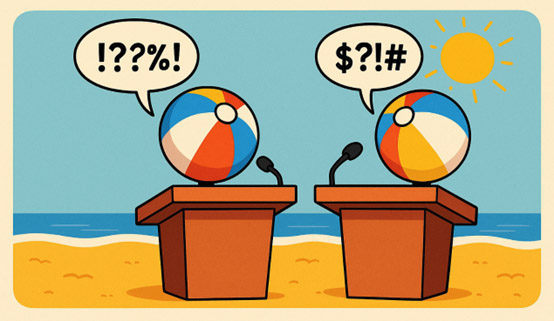From ‘unfortunate incident’ to discord with ‘those on the other side’, the political language that corrodes trust
By Flora Alexandrou
From antiquity to the present, wise voices have warned that a reckless word can ignite hatred, belittle human suffering, corrode trust, spark fear, or even turn ignorance into official policy. Politics, however, remains crowded with figures who let their tongues run far ahead of their minds.
The first example came in July, in the middle of the deadly wildfires that destroyed homes, lands and claimed two lives. Justice Minister Marios Hartsiotis dismissed those deaths as an “unfortunate incident”, a phrase that fell like shrapnel into an already suffocating atmosphere of grief and rage.
The second came in August, at the unveiling of the statues of Tasos Isaak and Solomos Solomou. There, the House president and Disy leader, Annita Demetriou, attempted to present herself as a unifying figure, perhaps even as the ‘Iron Lady’ of Cyprus. Yet in her speech about unity, she prescribed division: “It is not among ourselves that there should be discord, but with those ‘on the other side’.”
But those “on the other side” were not some vague metaphor. They were our compatriots, the Turkish Cypriots, the very people with whom the constitution dictates we must share this state. The same constitution Demetriou has sworn to uphold, but chose to ignore, or worse, to openly scorn.
Words matter. Especially in a country where division has etched deep scars, every careless phrase about “us” and “them” reinforces walls instead of building bridges.
Cyprus does not, of course, hold a monopoly on brainless political remarks. The international record is long and depressing: Belarusian president Alexander Lukashenko declaring in 2012 that “It is better to be a dictator than a homosexual.” Donald Trump tweeting in 2015, “If Hillary Clinton can’t satisfy her husband, what makes her think she can satisfy America?” And Silvio Berlusconi, who in 2008 thought he was being flattering when he called Barack Obama “young, handsome and suntanned”.
From Socrates’ dictum that “there is only one good, knowledge, and one evil, ignorance,” to Wittgenstein’s reminder that “the limits of my language are the limits of my world,” and Orwell’s warning that “if thought corrupts language, language can also corrupt thought,” the lesson has not lost its force.
But it has certainly lost its grip. Time and again, politicians show that their rhetoric can be more dangerous than their deeds. One suspects that if Socrates were alive today, forced to endure such talk, he would have ordered not one but two cups of hemlock.
This summer will be remembered not only for the wildfires that scorched land and lives, but also for the words that deepened public distrust in political discourse. On one side, the loss of human beings was trivialised as an “unfortunate incident”. On the other, “discord” was repackaged as patriotic duty against our supposed “opposites”.
So instead of insisting on the return of the “brains” that left Cyprus for abroad, the government should first make sure to keep those that are still here. In their skulls.
Flora Alexandrou works for the Spanish news agency EFE in Nicosia






Click here to change your cookie preferences